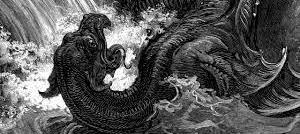
John 20:19-31 (Matins)
1 Corinthians 3:9-17
Matthew 14:22-34
"Who Then Is This?"
And they were afraid, and marveled, saying to one another,
"Who can this be? For He commands even the winds and water, and they obey Him!"
(Lu 8:25)
In the Name of the Father and of the Son and of the Holy Ghost. Amen.
We have been following the Son of God in His royal progress over the past several weeks.
As He passes through cities, towns, and even lost lands,
He has revealed His Royal Identity and Divine Authority to those who have hearts to behold it.
Those who do not,
who are "dull of heart" (He says),
will see but not perceive,
will hear but will not understand.
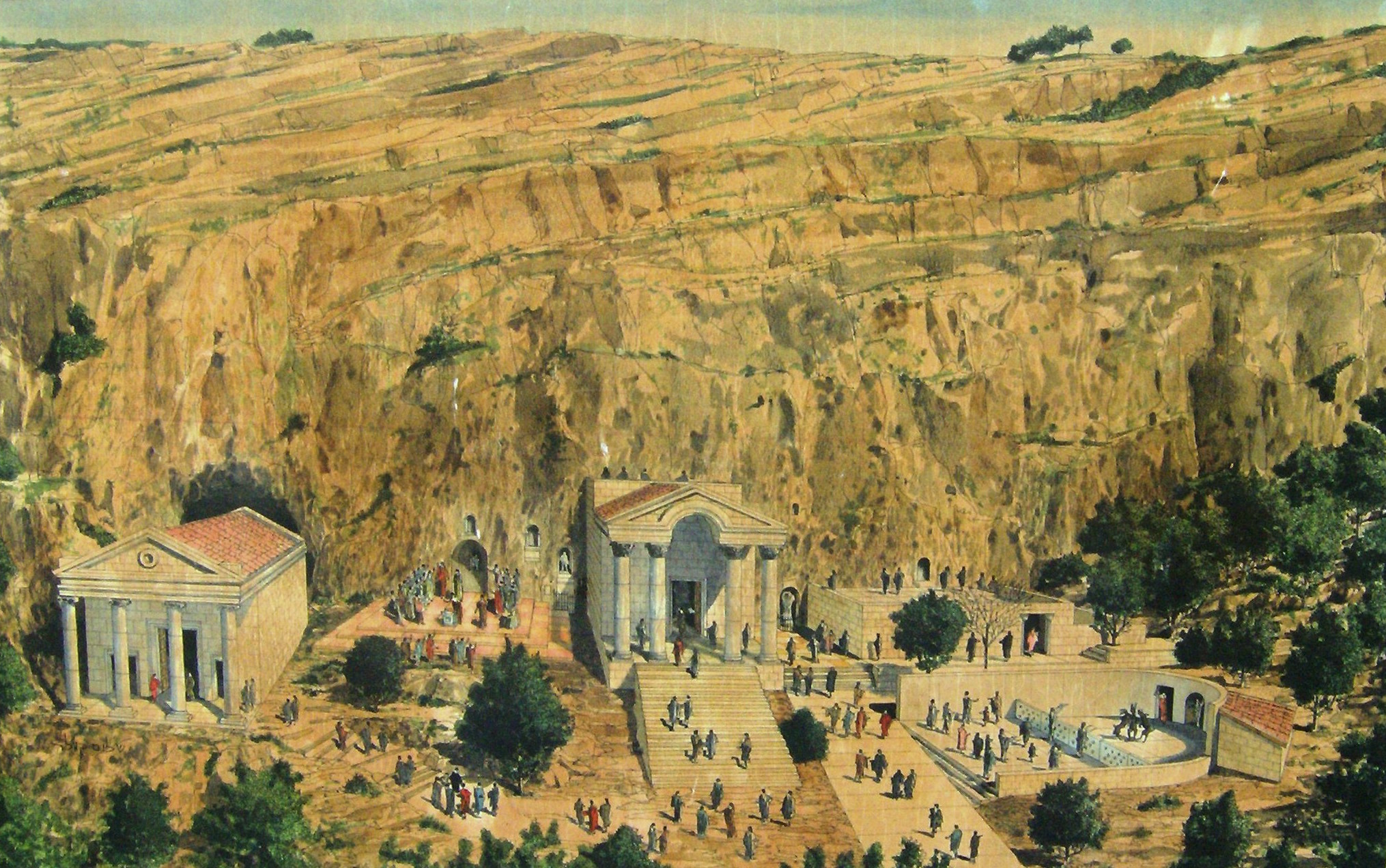
This past
Thursday,
we watched him seat His Disciples before great pagan shrines at Caesarea-Philippi,
ancient Banais,
a center of divine power in the pagan world.
Before them
stood
the Grotto of Pan,
the holiest shrine to the
the most ancient pagan god,
and
the Temple to Augustus Caesar,
declared Divus Augustus,
that is, "god,"
by the Roman Senate.
As the Disciples faced the Master,
seeing these impressive temples in the background,
He asked them,
|
Who do you say that I AM?
|
He then took John, James, and Peter to the top of a nearby summit,
where they heard the thundering words of God the Father:
|
"This is My beloved Son, in Whom I am well pleased. Hear Him!"
|
What more remains?
we might ask.
What is greater than to be God's Son?
These are incommensurables.
The words
great and greater stumble and fail midst this subject matter.
Yet,
a new and startling revelation still lies before us:
that the Lord Jesus is Master over even the elements,
which is to say,
Ruler over the Creation itself.
He alone might wrestle primordial chaos
and
bring out of it a world ordered to Heaven and subject to His Sovereignty.
Across the centuries,
and certainly during the Iron Age, Bronze Age, and Classical Antiquity,
this is what distinguishes God from lesser idols or kings:
mastery over the dark powers of chaos,
whose primary manifestation in the ancient mind
was the unconquerable sea.
In his Historia Anglorum (1154),
Henry of Huntington told the story of King Knut (d. 1035),
ruler of Norway and Denmark and conqueror of Britain.
In the famous story,
Knut sets his throne at the seaside
and
commands the tide not intrude upon his royal feet and costly robes.
The tide, of course, does advance,
pulling the legs of throne down into the flooding sand
and
soaking the king's feet and legs.
The king then leapt up and said,
"Let all men know how empty and worthless is the power of kings,
for there is none worthy of the name, but He Whom heaven, earth,
and sea obey by eternal laws."
|
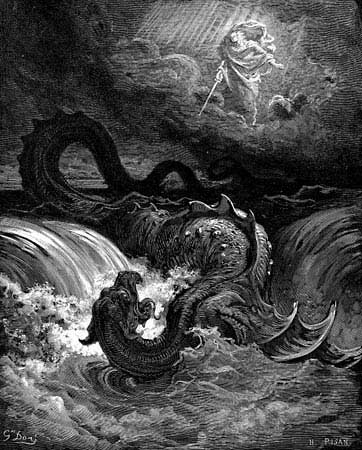
Undoubtedly,
the kernel of this story derives from the first chapter of Genesis.
For in the human imagination,
the sea has always been a dark, boiling cauldron of unruleable chaos.
It is YHWH alone, Who might subdue Leviathan, the enormous personification of sea-chaos.
Only YHWH might confront Rahab the sea-monster and rule her.
The "cohorts of Rahab lie prostrate at YHWH's feet,"
writes
Job (9:13).
And this primordial battle echoes through the Psalter:
The waters stood above the mountains.
At Your rebuke they fled;
(Ps 104:6-7)
You rule the raging of the sea;
When its waves rise, You still them.
You have broken Rahab in pieces,
as one who is slain;
(Psalm 89:9-10)
The waters saw You, O God;
The waters saw You, they were afraid;
The depths also trembled.
(Ps 77:16)
You divided the sea by Your strength;
You broke the heads of the sea monsters in the waters.
You broke the heads of Leviathan in pieces,
And gave him as food to the people inhabiting the wilderness.
(Ps 74:13-14)
|
"And gave him as food to the people."
YHWH's victory over sea monster
goes beyond mastery.
YWHW has wrested order from chaos.
And this act is not only life-giving;
it is the primordial gift of life:
The earth was without form, and void; and darkness was on the face of the deep.
And the Spirit of God was hovering over the face of the waters.
Then God said, "Let there be light"; and there was light.
(Gen 1:2-3)
|
Where the dark void had boiled in meaningless churnings,
a universe of life has appeared:
orderly,
fertile,
filled with light,
and
good (Gen 1:4).
The overall picture is of a harmonious and peaceable kingdom
which has
pushed out chaos
and
bounded it off with impassable, stout walls.
Chaos itself has not been vanquished.
It does not go away.
It has been ruled.
It is better to say that God has bounded off a Heaven and Earth
midst increate matter.
He has bounded off all that is good and life-giving
that His human creatures might dwell in safety.
And we must never forget that once you leave the earth,
all else is lifeless stones spinning in a void.
Chaos
—
disorder,
madness,
destruction
—
remain
unabated.
We might say that chaos is everywhere .... but here, within godly bounds.
As far back as the seventeenth century,
the presence of pervasive chaos was recognized as
being basic to our physics.
Sir Isaac Newton
reserved a most important place for it in his
Laws of Thermodynamics
(Philosophiae Naturalis Principia Mathematica, 1687)
declaring
that every random event contributes to the disorder of the universe.
That is,
the universe irretrievably tends toward its beginnings in chaos.
Chaos, we might say, is its inmost nature
and
its
prima materia
(its first matter).
Present theory holds that
the universe had been packed into a single atom
and
in 10-33 seconds
was unpacked releasing a cosmic burst of light,
which God alone might manage,
pure light out of absolute darkness,
utter order out of utter disorder.
We ourselves
experience
a world always unraveling back to its chaotic origins:
wood rots,
steel rusts,
stones scatter randomly falling down a hillside.
It is no exaggeration to say that our principle challenge
here on the Hermitage Farm is fighting chaos.
Milton captured the spiritual dimension of Chaos
in Paradise Lost.
High above all, above the most High Heaven, is God.
Beneath all,
in depths of deepest darkness presides Satan in Hell.
In between is Chaos
—
"eternal anarchy,"
"a wild abyss,"
where confusion reigns:
The secrets of the hoary Deep — a dark
Illimitable ocean, without bound,
Without dimension; where length, breadth, and height,
And time, and place, are lost; where eldest Night
And Chaos, ancestors of Nature, hold
Eternal anarchy, amidst the noise
Of endless wars, and by confusion stand.
(Paradise Lost II, 891-896)
|
Beneath all this
is the domain of all demons,
whose name in Greek is
πανδαιμονιον
/
pan-demonium,
our modern word for chaos.
Throughout the Gospels we see pandemonium with its restless opportunism everywhere.
Demons, even by the legion, inhabit and dominate humans who have let their guard down.
Their destructive power
drives a herd of swine to their death.
And the unruly sea might swiftly shatter a wooden boat:
And suddenly a great tempest arose on the sea, so that the boat was covered
with the waves. But He was asleep. Then His disciples came to Him and awoke
Him, saying, "Lord, save us! We are perishing!"
(Mt 8:24-25)
|
Do we not understand these things in the scale of our own lives?
We are surrounded by chaos.
Should we resign ourselves to it,
chaos would quickly take over,
reducing us in the end to not much more than compost.
Moral chaos
—
our consent to alcohol, drugs, promiscuity
—
is everywhere to be seen.
God alone is the light that will scatter the demons of this darkness.
God alone is the mighty warrior Who is equal to Chaos,
the hoary deep,
eldest night.
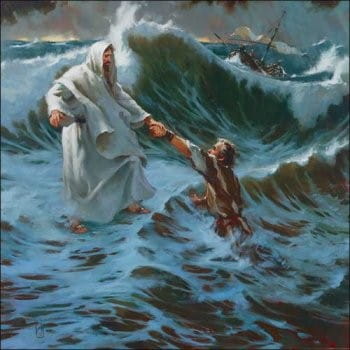 All of this is captured in Jesus walking upon the sea:
All of this is captured in Jesus walking upon the sea:
Now in the fourth watch of the night Jesus went to them, walking on the sea.
And when the disciples saw Him walking on the sea, they were troubled, saying,
"It is a ghost!" And they cried out for fear.
But immediately Jesus spoke to them, saying, "Be of good cheer! It is I; do not be afraid."
(Mt 14:25-27)
|
Which ghost does one encounter in the fourth watch of the night far out at sea if not Rahab
and her cohorts?
But where Rahab might have stood we see instead her conqueror.
Peter responds saying,
|
"Lord, if it is You, command me to come to You on the water."
|
Jesus replies, "Come!"
But when Peter encounters the first hints of Rahab's power
—
"the wind was boisterous"
—
he surrenders to fear,
which is the chaos always lurking within all of us.
Is it not fear that undoes us?
But Jesus is more than conqueror over this too:
And immediately Jesus stretched out His hand and caught him,
and said to him, "O you of little faith, why did you doubt?"
And when they got into the boat, the wind ceased.
|
None of these things is lost on the Disciples.
They have read the Scriptures.
They have read the Talmud.
They know who Rahab is,
and
they now know YHWH's Son when they see Him:
|
Then those who were in the boat came and worshiped Him, saying,
"Truly You are the Son of God."
(Mt 14:33)
|
What was true then is true today.
The basic character of our world is chaos.
Within each of us lies a fear of her great power.
We see it in the daily experiences of our lives.
We struggle day by day to keep good order.
We I was a young man, one of my favorite books was Walden (Henry David Thoreau).
So I too went to the woods that I might live deliberately.
I pictured myself in a cabin deep in the woods where I might live in harmony with nature.
Oh, I was about nineteen years old
living in a small cabin,
which was uninsulated and in the middle of the woods.
Quickly I discovered that chaos was a mighty adversary.
There were ants in my bed.
There were bugs in my walls.
There were flies flying everywhere laying their eggs in my food.
I was not at my ease, in harmony with nature.
I realized that I had to push out a permeter around my cabin.
I had to clear it of vegetation.
No I could not have tree limbs laying on my roof,
for then I would be invaded by all manner of vermin.
I had to push out a permeter,
which I raked.
I had to sweep.
I had to be on guard.
We live in a food chain.
And should we decide that we will not struggle every day to keep good order,
that our rivals will .... keep their own kind of order,
in which we become Sunday dinner.
We struggle in suburbia
that our houses not rot,
that our automobiles not rust.
We must discipline ourselves
—
in our grooming,
in our cleaning,
in our mental hygiene,
and
in our moral obedience.
We will quickly discover that a failure to do these things is disatrous.
For chaos will become rooted everywhere.
Our resistance,
our own orderliness,
is beautiful.
It is beautiful.
Anyone who visited my cabin would say,
"I am filled with a sense of peace."
And these were the fruits of my struggle against chaos.
Walk into any beautifully kept home,
stroll through its comely gardens,
and
you will feel that peace.
You will have confidence.
You will be renewed in your faith in humanity.
By contrast,
walk into any chaotic household.
Behold its ill-fed and filthy children.
Behold a life turned upside-down and conquered in every room.
Smell its stench.
Walk among the weeds outside
where vermin skulk and dart hither and yon.
Like Peter, you will shout in panic,
.... if you are wise.
You see,
we are drowning men and women.
And if we should venture out of the safe harbors that God has bounded in
and
made safe,
we quickly become swamped by waves,
even high seas.
And what began as adventure and bold independence
quickly unravels,
and
we find that we are not up to the challenge of wrestling Rahab.
Our only hope is God
and
His Son who
saves us.
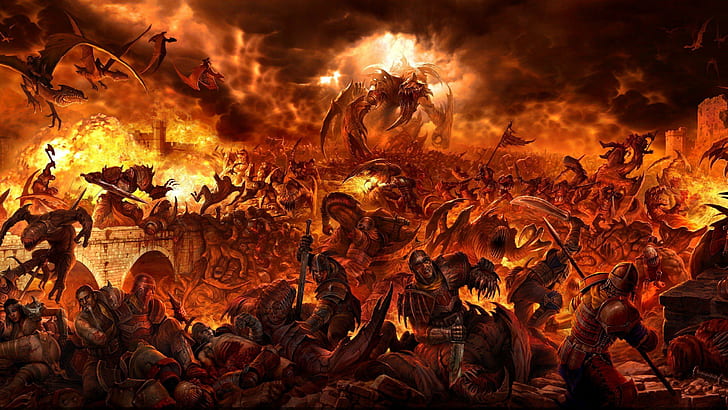
Let us call to mind His goodly Kingdom with its stout walls.
He
bounded off a lifeworld in a universe of chaos,
which is plain to see today.
And
then He gave us everything,
which was good.
For man was granted dominion over all creatures
(which is to say, everything created).
But we wanted more,
more than everything.
We wanted what lay beyond its outmost walls.
In particular,
we wanted the Knowledge of Good and Evil
—
not good and evil, mind you,
but the knowledge of good and evil.
That is,
we wanted to be arbiters of moral theology:
we would write the book on right and wrong.
Each of us would decide his or her own truth.
You have heard these claims to "truth":
"I have my needs!
I have to do what I have to do!"
"It's nobody's business but my own!"
In the end, we discover that we are not up to this work ....
and that no one is.
Look around you.
Do you not live in a world of failed truth-claimers.
Increasingly,
this is the view of children of their parents,
who set out do claim their own truth .... to the cost, even ruin, of their families.
Which examples can you point to of such people
—
the "cynosure of neighboring eyes,"
admired by all?
No, not a single one.
Yet,
mankind chose for what lay beyond the walls of everything-that-was-good.
And he received what he chose:
personal chaos,
social chaos,
general chaos.
Years ago, (I was in seminary) I read an Orthodox elder
who roused my spirit and captured my imagination.
There was one sentence that stood out.
I will never forget its effect on me:
|
Apart from the life of prayer lies only madness.
|
Let us take hold of this lifeline, morning and night.
Let us once more breathe the pure oxygen of God's orderly Kingdom.
Let us renew hope that we might return to God's Paradise of everything good.
For all else, literally, is Pandemonium.
In the Name of the Father and of the Son and of the Holy Ghost.
Amen.



 All of this is captured in Jesus walking upon the sea:
All of this is captured in Jesus walking upon the sea:
